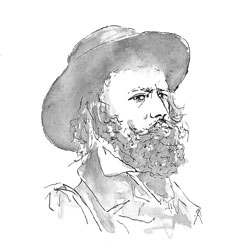Music and Meaning (5): Memnon’s Breathlessness in ‘The Palace of Art’ and ‘A Fragment’
In lines 159-160 of 'The Palace of Art', the narrator declares how his soul 'sat betwixt the shining Oriels, To sing her songs alone.' Melodies arise 'from her lips', the poet then recounts,
... as morn from Memnon, drew
Rivers of melodies.
According to Greek mythology, Memnon was the son of , and still today there is a statue (possibly erroneously) named after him in Thebes. Take a look at Bernard Picart's illustration [http://upload.wikimedia.org/wikipedia/commons/a/ae/Picart_-_Memnon.jpg] as you re-read the short extracts from 'The Palace of Art' that are presented above. Why do you think Picart has focussed so much attention on the sun, which he depicts as rising from the left-hand side of the artwork, and what does Tennyson mean when he says that songs rise from the soul's lips 'as morn from Memnon, drew / Rivers of melodies'?
Both of these things can be explained by the fact that (as legend has it) the statue of 'Memnon' in Thebes makes music whenever it is struck by the rising sun. Keeping this legend in mind, what do you think Tennyson is trying to say about the connection between human minds and aerial music in these closing lines of an earlier poem about Memnon - 'A Fragment [Where is the Giant of the Sun]' - which he published in 1830?
Thy Memnon when his peaceful lips are kist
With earliest rays, that from his mother's eyes
Flow over the Arabian bay, no more
Breathes low into the charmed ears of morn
Clear melody flattering the crisped Nile
By columned Thebes. Old Memphis hath gone down:
The Pharaohs are no more: somewhere in death
They sleep with staring eyes and gilded lips,
Wrapped round with spiced cerements in old grots
Rockhewn and sealed for ever.
With its declaration that Memnon no longer 'breathes low into the charmed ears of morn' and its closing image of pharaohs being 'wrapped round', 'rockhewn' and 'sealed [away] for ever', this 'Fragment' would suggest that mankind is becoming less able to hear aerial melodies, not more (as was confidently hoped in 'To Poesy'). In 'The Palace of Art' as well, of course, the soul loses her ability to sing like Memnon. What do you think Tennyson is suggesting about the power of poetry in both of these cases?
[Go on to Music and Meaning (6): 'The Lotus-Eaters' as 'A Tale of Little Meaning']
